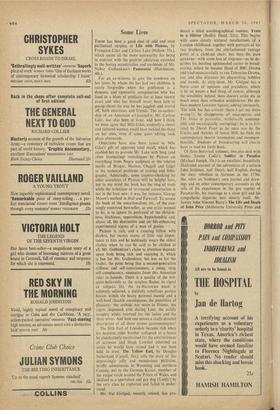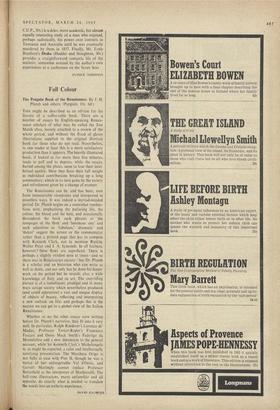Some Lives
THERE has been a good deal of odd and even puritanical carping at Life with Picasso, by Frangpise Gilot and Carlton Lake (Nelson, 35s.), which seems all the more noteworthy for being in contrast with the positive adulation extended to the boring eccentricities and snobbism of Mr. Nuba r Gulbenkian's Pantaraxia (Hutchinson, 40s.). • For an ex-mistress to give the lowdown on her lover, by whom she has had two children, is surely forgivable when the gentleman is a dynamic and egocentric octogenarian who has lived in a blaze of publicity for at least twenty years and who has himself never been loth to gossip about the way he has juggled, and scored off, both mistresses and friends. The co-author- ship of an American art-journalist, Mr. Carlton Lake, has also been at issue, and here I think we must agree that Mlle Gilot, evidently a clever and cultured woman, could have tackled the thing on her own, even if some quiet editing took place afterwards.
Objections have also been raised to Mlle Gilot's gift of apparent total recall, which has enabled her to provide Mr. Lake with long (and often fascinating) monologues by Picasso on everything from Negro sculpture or the relative merits of Braque, Matisse, Chagall and Leger to the technical problems of etching and litho- graphy. Admittedly, some counter-checking by other associates of Picasso will be helpful here, but to my mind the book has the ring of truth while the technique of re-created conversation is not in the least new; it was, for instance, George Moore's method in Hail and Farewell. To accuse the book of the sensationalism, etc., of the cun- ningly contrived best-seller, as one critic seemed to do, is to ignore its portrayal of the childish- ness, bitchiness, superstition, hypochondria and, above all, the destructive and yet life-enhancing experimental vigour of a man of genius.
Picasso is rich, and a cunning fellow with dealers, but money seems of little real impor- tance to him and he habitually wears the oldest clothes when he can be said to be clothed at all. Mr. Gulbenkian's claim to attention depends upon both being rich and enjoying it, which is fun for Mr. Gulbenkian, but less so for the reader, the point being that a second-generation stiffness and self-consciousness, a smug, snug self-complacency, emanates from this Armenian rider to hounds. There is a quality of the not- quite-believable as the eyeglass flashes its signal of solipsist life, the ex-Harrovian mask is solemnly adjusted, a dutifully rebellious gesture
heaves within the heavy paternal mantle and a well-bred chuckle encompasses the punctilios of .pleasure: the orchids not worn in France, the cigars dispensed with during Lent, the mildly naughty winks reserved for the ladies and the three wives. And how one misses a really detailed description of all those menus gastronomigues1
The fifth Earl of Lonsdale became rich when his neurotic elder brother collapsed in a house he clandestinely maintained for the entertainment of actresses and Hugh Lowther inherited an estate he would have ruined had it not been held in trust. The Yellow Earl, by Douglas Sutherland (Cassell, 36s.), tells the story of this depressingly jolly and mendacious philistine, briefly adventurous in Wyoming and northern Canada, pal to the German Kaiser, member of the vulgar circle around the Prince of Wales, and idolised as a sportsman and gay dog ('Lordy') by the very class he exploited and failed to under- stand.
Mr. Val Gielgud, recently retired, has pro-
duced a third autobiographical venture, Years in a Mirror (Bodley Head, 25s.). This begins with some closely textured recollections of a London childhood, together with portraits of his two brothers, from the old-fashioned vantage point of a clubland chair; but then the pace quickens—with some loss of elegance—as he de- scribes his bustling opinionated career in broad- casting, where he became Head of BBC Drama and tried unsuccessfully to run Television Drama, too, and also discusses his playwriting, hobbies and travels. At sixty-three, Mr. Gielgud has a fierce crust of opinions and prejudices, which is by no means a bad thing, of course, although the sensibility behind them doesn't strike me as much more than orthodox middlebrow. He dis- likes modern Leicester Square, adding ominously, 'The milk bar has arrived' (have I got my dates wrong?); he disapproves of soap-operas and The Dales in particular, 'aesthetically contemp- tible and sociologically corrupting'; he is as irri- tated by David Frost as he once was by the Uncles and Aunties of Savoy Hill; he finds the contemporary theatre 'anomalous and incompre- hensible.' Students of broadcasting will clearly have to read his lively book.
Of three historical volumes, two also deal with limbo. Louise Collis's Soldier in Paradise (Michael Joseph, 35s.) is an excellent, beautifully illustrated account of the adventures of a certain John Stedman, half Dutch, half English, during the slave rebellion in Surinam in the 1770s. She relies on Stedman's own journal and draw- ings and on other contemporary accounts as she tells of his experiences in the gay capital of Paramaribo, his marriage to a slave girl and his sympathetic inquiries into slavery itself,• Mr. Justice John Vincent Barry's The Life and Death of John Price (Melbourne University Press and
C.U.P., 50s.) is a drier, more academic, but almost equally interesting study of a man who enjoyed, perhaps sadistically, his power over convicts in Tasmania and Australia until he was eventually murdered by them in 1857. Finally, Mr. Ernie Bradford's Drake (Hodder and Stoughton, 30s.) provides a straightforward romantic life of the seafarer, somewhat assisted by the author's own experiences as a yachtsman on the Seven Seas.
PATRICK ANDERSON















































 Previous page
Previous page